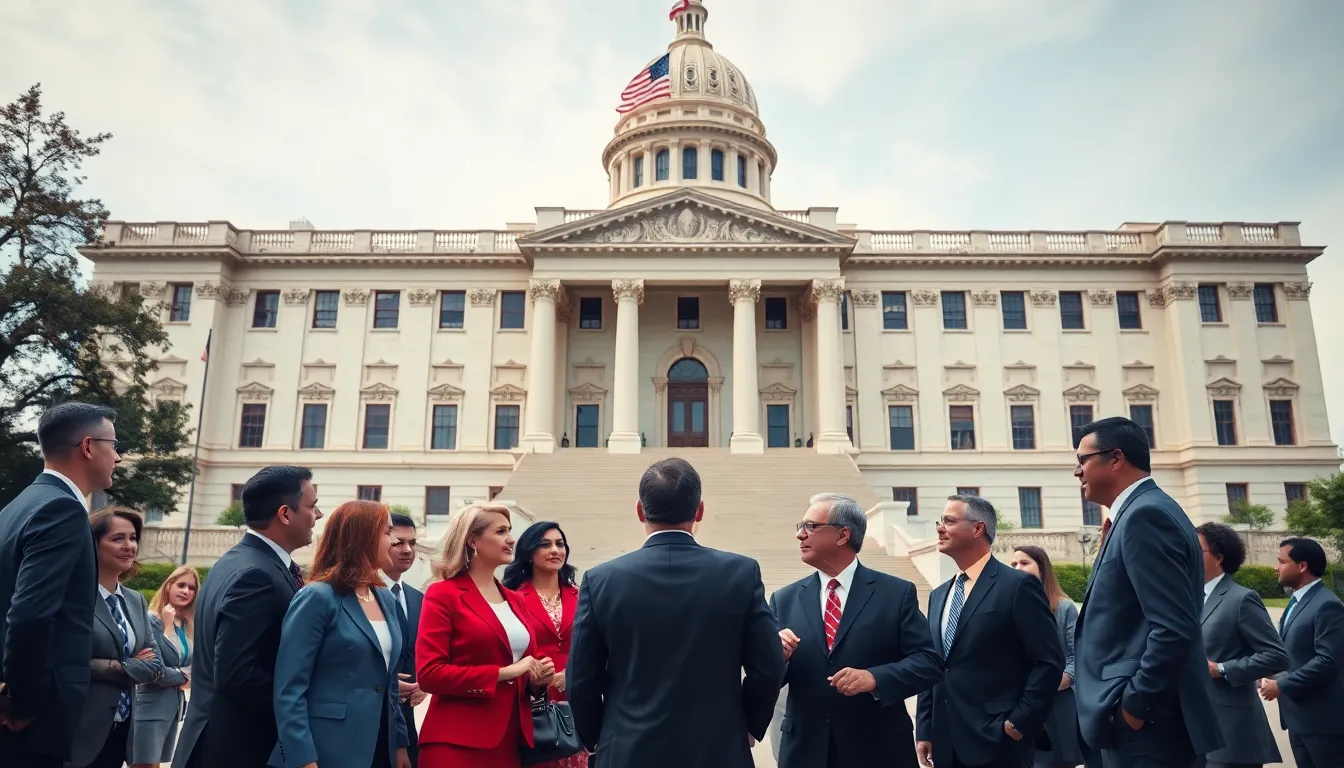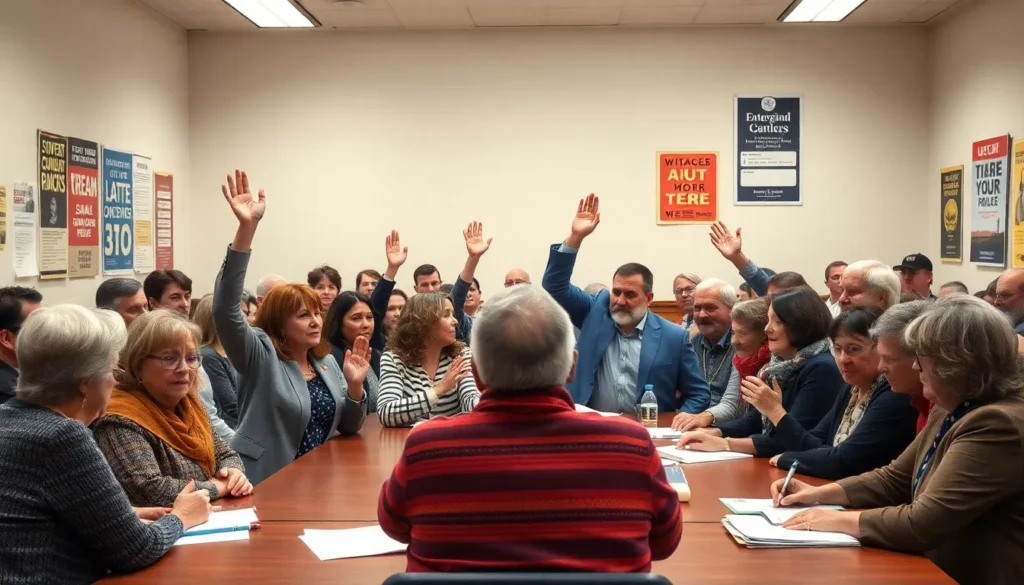Politics can feel like a never-ending circus, complete with juggling acts, tightrope walkers, and the occasional clown show. Yet beneath the theatrics lies a world that shapes lives, economies, and futures. Understanding political affairs isn’t just for the news junkies or the debate enthusiasts; it’s crucial for anyone who wants to navigate the complexities of modern society.
In a landscape where policies can change faster than a politician’s promises, staying informed is more than a pastime—it’s a necessity. From local elections to international treaties, every decision has a ripple effect. So, grab your popcorn and get ready to dive into the fascinating world of political affairs, where knowledge is power and every vote counts.
Table of Contents
ToggleOverview of Political Affairs
Political affairs encompass the spectrum of activities and decisions that shape governance and public policy. These matters influence individuals and communities, making participation in political discourse necessary for everyone. Local elections often determine representatives who impact everyday lives, while national policies can shift the direction of entire countries.
Insights into political affairs reveal trends that affect social justice, economic stability, and environmental sustainability. Analyzing legislation provides a clearer understanding of how laws are crafted and enforced. Voter participation statistics indicate engagement levels, revealing how connected citizens feel to their political systems.
Global relationships are influenced by treaties, trade agreements, and diplomatic actions. Countries negotiate on pivotal issues, such as climate change and human rights. Trade policies significantly affect economies, creating ripple effects both locally and internationally.
Media plays a vital role in disseminating information about political affairs. News outlets and social media provide updates that keep citizens informed about current events. Awareness of these developments fosters critical discussion and encourages active engagement in the political process.
Polling data shows public opinion on various issues, highlighting citizen priorities. Advocating for specific policies can lead to grassroots movements, changing the political landscape. By understanding political affairs, individuals empower themselves to make informed decisions and hold leaders accountable.
Engagement in political affairs leads to the formulation of collective identities and shared values. These factors contribute to a more informed electorate, paving the way for sustained civic involvement. Knowledge of political contexts ultimately enables citizens to navigate the complex interactions that define governance and public life.
Key Players in Political Affairs

Understanding the key players in political affairs is essential for grasping the complexities of governance and public policy. Each group plays a significant role in shaping political outcomes.
Government Institutions
Government institutions act as the backbone of political systems. Legislatures create laws that define how society functions. Courts interpret laws and ensure justice is upheld. Executive branches enforce regulations and execute policies. Additionally, local governments affect community decisions. Each institution interacts with the others, creating a dynamic political landscape.
Political Parties
Political parties represent groups of individuals with shared ideologies and policy goals. Parties mobilize voters during elections. They articulate positions on key issues like healthcare, education, and foreign policy. National and state parties organize campaigns and allocate resources. Third parties, while less prominent, can influence larger parties by introducing new ideas. Each party works to gain voter support, impacting the political environment significantly.
Interest Groups
Interest groups advocate for specific issues or causes, seeking to influence policy decisions. They represent a diverse range of interests, including business, labor, environmental concerns, and civil rights. Through lobbying, they strive to connect with policymakers and persuade them to support favorable legislation. Grassroots movements often emerge from these groups, encouraging public participation and raising awareness. Each interest group contributes uniquely to the broader political discourse, highlighting the variety of perspectives within society.
Current Trends in Political Affairs
Political affairs continuously evolve, reflecting societal needs and global challenges. Staying informed enhances understanding of these dynamic changes.
Global Issues
Societal movements regarding climate change significantly shape international relations. Increasingly, governments prioritize sustainability and environmental policies. Trade agreements illustrate how countries cooperate to address economic instability. Voter sentiment trends now reflect a growing concern for global health and safety issues. Rising tensions across various regions also drive discussions around diplomacy and strategic alliances. The climate crisis, public health emergencies, and humanitarian efforts become focal points in political discourse, impacting decision-making and resource allocation. Understanding these trends enables individuals to comprehend the interconnectedness of local and global governance.
Local Dynamics
Local political landscapes reflect diverse community needs and challenges. Civic engagement in town halls and school board meetings directly influences local governance. Recent elections reveal shifts in voter demographics, prompting politicians to address issues like affordable housing and education reforms. Local initiatives on policing and community safety highlight the demand for responsive governance. Additionally, grassroots movements mobilize citizens around pressing social issues, altering traditional political structures. Representation at the local level significantly affects everyday life, making active participation crucial for communities eager for change. Engaging with local political affairs empowers citizens to shape their environments actively.
Challenges Facing Political Affairs
Political affairs encounter numerous challenges that hinder effective governance and public trust. These challenges shape political landscapes and influence citizen engagement.
Corruption and Transparency
Corruption undermines the integrity of political systems. It erodes public trust and creates barriers to effective governance. Transparency holds the key to combating corruption. Citizens demand access to information regarding government operations and decision-making processes. When transparency exists, accountability improves, leading to stronger institutions. Reports indicate that countries with high transparency ratings experience reduced corruption levels. Encouragement of whistleblower protections aids in exposing corrupt practices. Building a culture of transparency fosters trust, vital for citizen engagement.
Voter Engagement
Voter engagement significantly influences political affairs and democratic processes. Low participation rates often indicate disinterest or disenfranchisement among citizens. Engaging voters ensures representative governance and accountability. Recent studies show that local elections have higher turnout when community issues resonate with voters. Utilizing social media platforms enhances outreach and mobilization efforts. Educational initiatives inform citizens about their voting rights and the impact of their votes. Configuration of outreach strategies must address diverse demographics to boost participation. Ultimately, increasing voter engagement strengthens democracy and fosters civic responsibility.
Political affairs play a crucial role in shaping the world around us. By staying informed and engaged individuals can influence decisions that affect their lives and communities. Understanding the complexities of governance and public policy empowers citizens to advocate for their interests and hold leaders accountable.
As political landscapes evolve it’s essential to recognize the importance of transparency and active participation. The challenges facing political systems require a collective effort to foster trust and accountability. By prioritizing civic engagement and education everyone can contribute to a more vibrant democracy.
Ultimately a well-informed electorate is key to addressing pressing issues and driving meaningful change. Embracing the intricacies of political affairs not only enhances personal empowerment but also strengthens the fabric of society.




